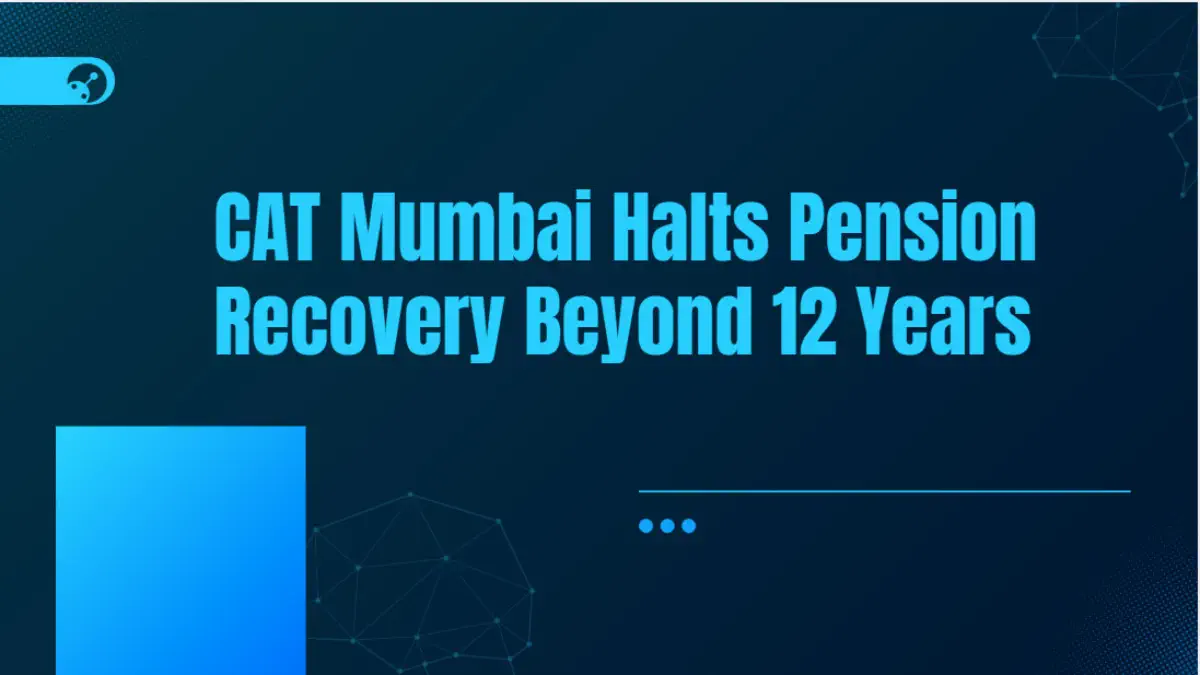CAT Mumbai Puts Brakes on Pension Recovery Beyond 12 Years for Retired Postal Staff

In a landmark interim order, the Central Administrative Tribunal (CAT), Mumbai Bench, has directed the government to halt the recovery of commuted pensions from a group of retired postal employees who have completed 12 years since their retirement. Delivered on November 11, 2024, the ruling brings much-needed relief to pensioners challenging the outdated rules mandating a 15-year recovery period.
The Case: A Battle Over Pension Rules
The applicants, retired officials from the Department of Posts, had commuted 40% of their pensions upon retirement. As per the Central Civil Services (Commutation of Pension) Rules, 1981, this commuted portion is recovered in installments over a 15-year period.
However, the applicants argued that the recovery period is no longer reasonable or fair. They based their claims on several grounds:
- Changing Demographics and Economics:
The 5th Central Pay Commission had recommended reducing the recovery period to 12 years, citing falling mortality rates and reduced interest rates, which now stand at 5.4%–6.5% compared to 16% in the 1980s. - Precedents from States:
States like Gujarat and Andhra Pradesh have already implemented shorter recovery periods of 12 and 13 years, respectively. - Calculations Supporting Their Claims:
The applicants demonstrated, using detailed examples, that the entire commuted pension amount is recovered within 12 years, making the additional three years unnecessary.
In addition to these points, the applicants contended that continuing recovery beyond 12 years amounts to unjust enrichment by the government.
Applicants’ Demands
The retirees sought several key reliefs, including:
- Amendment to Rule 10A of the Central Civil Services (Commutation of Pension) Rules to reduce the recovery period from 15 years to 12 years.
- A refund, with 6% interest, of any amounts recovered beyond the 12-year period.
- A halt to future recoveries for pensioners who have completed 12 years since retirement.
The Tribunal’s Interim Ruling
After considering arguments from both sides, the tribunal granted interim relief to seven applicants who had completed 12 years post-retirement. In its order, the tribunal directed the government to cease recovery of commuted pensions from these applicants until the final verdict is issued.
Key observations by the tribunal included:
- Admitted Recovery Timeline:
The respondents did not dispute that the full commuted pension amount is recoverable within 12 years. This undermined their case for continuing deductions until 15 years. - Support from Judicial Precedents:
The Punjab and Haryana High Court, in similar cases, has already granted relief to pensioners, a decision that has not been stayed by the Supreme Court. - Inconsistent Policies:
The tribunal questioned why other states have adopted shorter recovery periods while the central rules remain unchanged.
Arguments from the Government
The Union of India opposed the interim relief, arguing:
- The challenge to the 1981 rules is barred by limitation, as these rules have been in force for over four decades.
- Commuting one’s pension is a voluntary decision, and pensioners agree to the recovery terms when opting for it.
- As long as Rule 10A is in effect, it is legally binding, and the tribunal cannot grant relief.
Despite these arguments, the tribunal sided with the applicants, highlighting the government’s failure to justify the extended recovery period.
What This Means for Pensioners
This decision is a game-changer for central government retirees, many of whom have long argued that the 15-year recovery period is excessive. While this is an interim relief, it signals growing judicial support for revising outdated pension rules to reflect current economic and demographic realities.
If the final decision upholds the applicants’ claims, it could pave the way for a broader overhaul of the CCS (Commutation of Pension) Rules, 1981, benefitting lakhs of pensioners across the country.
Future Proceedings
The tribunal has scheduled the next hearing for December 19, 2024. In the meantime, the interim relief remains in place, offering immediate respite to the affected retirees.
View CAT order below:
 Loading…
Loading…




